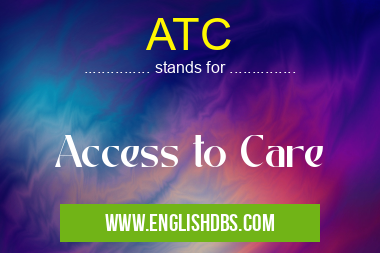What does ATC mean in UNCLASSIFIED
ATC stands for Access to Care and is typically used in the context of healthcare. It refers to the ability of patients to obtain access to medical care when needed, with a particular focus on disadvantaged or underserved communities and populations. ATC seeks to improve and expand access to health services, including preventive care, chronic and acute illness management, mental health services, etc. Access to Care also encompasses efforts that focus on improving education, health promotion and prevention activities within communities.

ATC meaning in Unclassified in Miscellaneous
ATC mostly used in an acronym Unclassified in Category Miscellaneous that means Access to Care
Shorthand: ATC,
Full Form: Access to Care
For more information of "Access to Care", see the section below.
What is ATC?
Access to Care is an umbrella term that covers a variety of initiatives designed to improve access to quality healthcare for individuals who may face barriers - such as poverty, insurance coverage or cultural or linguistic differences - that limit their ability to receive adequate care. When a patient has difficulty accessing medical assistance due to these factors – or when they are unable to pay out-of-pocket expenses – ATC initiatives are put in place by healthcare providers, community-based organizations and government agencies. These programs help bridge gaps in service delivery for these historically underserved groups and work toward achieving better health outcomes over time through improved coordination between social services, health systems and other providers.
How Does ATC Work?
Approaches for Access To Care typically involve programs that increase the availability of primary care services through expanded use of electronic health records (EHRs), financial incentives for providers offering medical services on a sliding fee scale based on household income levels, the establishment of emergency funds for uninsured or underinsured patients seeking treatment options outside their primary care provider’s offices; the use of mobile clinics with multidisciplinary teams providing basic preventive care at no cost; telemedicine programs connecting remote areas with specialist providers;supporting local organizations within underserved communities; outreach campaigns addressing cultural perceptions related to seeking care; as well as efforts aimed at reducing transportation costs associated with required treatments.
Essential Questions and Answers on Access to Care in "MISCELLANEOUS»UNFILED"
What is an Access to Care program?
Access to Care is a preventative healthcare and human services program that works to ensure all communities have access to quality health care. It helps people navigate resources and provides assistance in finding medical professionals, providers, or other sources of health services.
How do I enroll in Access to Care?
Enrollment for Access to Care programs can vary depending on the state or local government guidelines. Generally speaking, registration can be done online or by visiting the website of your state's primary care access organization. You may also need to provide proof of residency and contact information when enrolling.
Does Access to Care cover my medical expenses?
While every program varies, some Access to Care programs do provide financial support for medical expenses such as prescriptions, doctor visits, lab tests, and other services related to health insurance coverage. Contact your local healthcare provider or primary care access organization for more specific details about your coverage options.
Are there any age restrictions for Access to Care programs?
Most Access to Care programs are available regardless of age; however many programs prioritize those who are most vulnerable such as seniors, children, low-income households, military veterans and disabled individuals. Check with your local provider or primary access organization for more details about eligibility requirements.
Who is eligible for participation in Access to Care?
Eligibility for these programs depends on the particular state or local guidelines; however most often they are applicable across all ages and income levels including low-income households, military veterans, seniors, disabled individuals and children. Contact your local healthcare provider or primary care access organization for more specific details about eligibility requirements in your area.
Does my insurance cover costs related to an Access to Care program?
Depending on the particular program you are enrolled in and type of insurance plan you have purchased there may be some coverage associated with an Access To Care program; however generally speaking these plans are not typically covered under private insurance plans due the subsidized nature of the services provided through an ATAC system. Contact your insurance company directly for more specific details regarding what services may be covered under your policy terms.
What types of services does an Access To Care program provide?
The range of necessary health care interventions provided under any given ATAC system will vary depending on the particular needs identified within that community; however generally speaking these plans will provide access to resources such as transportation options for appointments; assistance in finding providers; helping individuals maintain medications; providing mental health support referrals and patient navigation services. Referring providers will also offer diagnostic testing if needed based on individual circumstances..
What should I bring when I go for an appointment through an ATAC system?
When attending an appointment via an ATAC system it’s important that you bring any relevant documents ‘such as your personal identification (ID), current prescriptions list, immunization record (if applicable), insurance card(s) if available along with any other documents required by your appointment provider which may include records detailing prior test results or diagnosis.
Final Words:
The goal of Access To Care initiatives is not only ensuring that all individuals have access to the healthcare they need when they need it, regardless of socioeconomic background or geographic location but also helping healthcare professionals address disparities in quality of life amongst more vulnerable groups within society by providing them comprehensive primary ambulatory care services . By placing emphasis on collaborative approaches engaging multiple stakeholders at a local level - including patients themselves – great progress can be made towards improving both public health outcomes as well as overall quality of life within communities.
ATC also stands for: |
|
| All stands for ATC |
